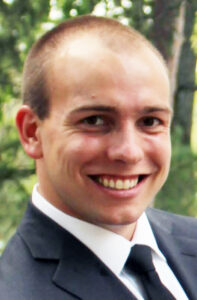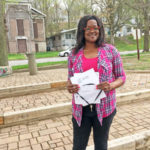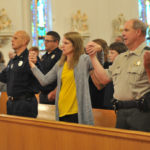(Editor’s note: Patrick Schmadeke, 27, is a graduate of St. Ambrose University (‘13) and a student in the Master of Divinity program at the University of Notre Dame. His column offers reflections on his coursework, engaging with the richness of the Catholic tradition and its relevance to the world today.)
At no other time of year do days blend together so completely as they do during the holiday season. Engaging in parish activities, traveling to visit loved ones, preparing more food than could possibly be consumed and, a personal favorite, delighting in more than just one piece of apple pie, are all par for the course. That we share these activities with family and friends shows that these weeks are a time of togetherness. This flurry of activity, despite bringing so much joy, is often disorienting.

Like the abrupt surprise of a morning fog, we suddenly discover ourselves having slipped into a spiritual complacency, not knowing how or when we got there. Our routines (such as prayer) run amok; we lose sight of that which keeps us grounded. Our priorities are all out of wack, we are in need of centering.
In last Sunday’s Gospel, Christ admonishes his followers to be vigilant, for “you do not know when the Lord of the house is coming” (Mark 13:35). In this season of Advent, we not only celebrate the birth of Christ, but anticipate his second coming (Catechism of the Catholic Church, No. 524). The focus that this anticipation demands of us should lift us from the fog of our confusion and, yet, clarity is not achieved so simply.
The Scriptures are a useful but difficult guide. We should recall that even people identified in the New Testament who knew Jesus were confused about his identity and mission. He was not the “political” or “warrior” Messiah that many people expected the Messiah to be. We can fast forward to two saints of the late 4th to early 5th centuries to help us clarify our anticipation of the Messiah in this season of Advent.
St. Augustine helps us sort out this confusion. In his work “Teaching Christianity,” he writes, “the fulfillment and the end of the law and of all the divine scriptures is love” (No. 39). If our actions do not reflect the “twin love of God and neighbor” (No. 40) then we misunderstand the Scriptures. Augustine observes that the trajectory of the biblical narrative is towards love, and if we do not love then we have missed the point. Augustine sees the person, mission and presence of Jesus Christ as thoroughly bound up in love.
Around the same time in history, St. Ambrose of Milan, whose feast day we celebrate on Dec. 7, deepens our understanding of this love. He says in his book “On Penance,” “Your true neighbor is not one who is bound to you by a like nature, but the one whom mercy has intimately united to you!” (Book I, No. 28). In other words — our neighbors are those people who we would prefer to just ignore. This is a radical, nonsensical love, and in it we recognize the message of Christ. The church of Christ shows love and mercy to all, and we are commanded to embody this example, which is especially relevant as we anticipate Christ’s return during this season of Advent.
Christian theology calls the second coming of Christ the parousia. While this traditionally refers to the end times, we ought to reflect on how the parousia is already here. Our guide for recognizing the face of Jesus has but one criteria — love. We do not have to wait for some distant second coming, Christ is already present. The Gospel and the saints of our tradition witness to this mystery.
Beyond merely recognizing Christ, however, we are called to be Christ to one another. We do this in a moment of gentleness that melts a hardened heart, through accompaniment in times of difficulty and in our presence to share in celebration. We do this when we recognize our sister in the migrant, our brother in the Muslim, our friend in the Buddhist. Allowing the reality of Christ in one another to transform us is our Advent task. Catching a mere glimpse of Christ’s face moves the deepest part of our soul. But Advent calls us to more than a mere glimpse; it calls us to focus our gaze eternally upon the one who is Love.











